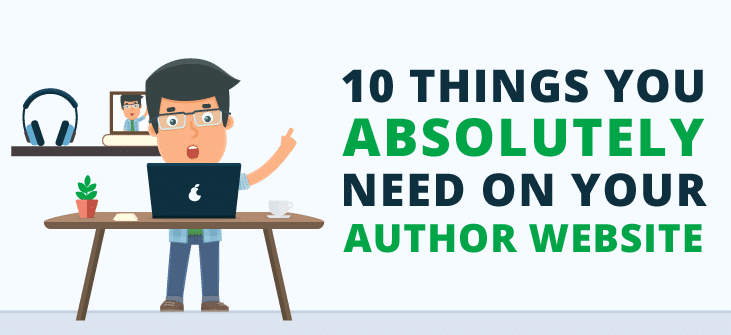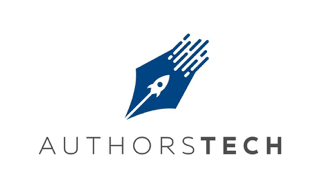
There are some affiliate links below and I may receive commissions for purchases made through links in this post, but these are resources I highly recommend. I won't put anything on this page that I haven't verified and/or personally used 🙂
It goes without saying that if your really want to advance your name and career, you'll need a dedicated website in order to showcase your work. It's going to be your home online, your Platform that will encapsulate and embody your presence on the interwebs. So many people, however, structure their websites in the wrong way. There's either too much stuff on them, or too little. But something this important needs some careful consideration, so that it's done just right.
Following are 10 things you absolutely need on your author website. Incorporate all of them, and you'll be good to go...
A Great Theme
Being able to customise the design of your website is essential in order to make your content more personal and make it seem part of an overall 'shared feeling' with your other materials (book covers, for example). A good theme will allow you to change and tweak fonts, colours and other elements, so that the resulting pages are unique to you and your brand.
I've been researching and using various themes, but the absolute best I found is Thrive Themes. Their actual theme templates are not that great, I'll give you that (though updated versions are coming soon). What I really love is the whole package that comes with the themes themselves. Plugins such as Thrive Leads, Thrive Quiz Builder and many other are superb, and make this suite of products the absolute best that's out there. Many authors advocate the use of products such as Divi or Elementor, but - believe me - the Thrive complete package is something you won't regret buying (plus, for what you get, it's still ridiculously underpriced!)

What Can I use?
My best recommendation for a good theme you can use for your author website is - hands down - Thrive Themes. Their suite of products (which you can purchase all together) is unparalleled on the market, and still ridiculously underpriced. Thoroughly recommended.
An Email Address Capturing System
Your email list of readers is your number one asset. There is no question about that, and I can't even begin to list all the benefits an engaged list can bring to your author brand and career. Reviews, sales, engagement... all come from your personal batch of contacts.
The reality is that many authors don’t appreciate the correlation between list size and generated revenue. This may seem preposterous, especially considering that there are around 4 million active email addresses around the world. This means that building up a notable email list is one of the leading keys to having your message delivered across a wide range of people.
I'll be creating a very specific, in-depth post about building your email list, very soon.
However, if you're looking for a primer on the subject, read this book by Kristen Oliphant.
Also, if you’re unsure where to start looking for one of the best marketing tool for authors, we recommend ConvertKit – especially if you want to shy away from the “one size fits all” rule and find something truly unique.

What Can I Use?
I've tried many ESP's (Email Service Providers): Mailchimp, Aweber, etc. However, I've found the best to be ConvertKit. It's incredibly easy to use (their knowledge-base is great), support is top-notch and still quite cheap for all it offers. Check it out here!
A Lead Magnet
I have mentioned email lists are highly valuable. And believe me when I say so. The next question is how do you expand on it? Here is where the concept of ‘lead magnet’ comes in handy. For those who are not familiar with this terminology, a lead magnet refers to a small report (cheat-sheet, sample chapter, character profile) an individual chooses to download in exchange for entering their email address. It’s as simple as that!

Why Is This Important for Authors?
Lead magnets are important for any on-line business. Author and publishing guru Nick Stephenson was the first who discovered the concept of lead magnets could be applied to authors, too. He thus coined the name "Reader Magnets" and wrote a whole book about this very subject.
Reader Magnets are what attracts readers to YOU and your work. The ultimate goal is to create a force that draws more and more readers in. Once this is done, you establish a robust and valuable connection which will last for a long time. After all, most authors dream of a flourishing relationship with their audience and reader magnets can be viewed as a direct line to achieving this otherwise intimidating goal.
By using Reader Magnets, you are able to ultimately establish a reliable connection and create a mutual agreement in which you have their contact details - for a good reason - and they purchase your literary creation.
A Killer 'About' Page
Another aspect which writers don’t give enough attention to is their ‘About’ page. This should act as your opportunity to introduce yourself and your service, similar to an important interview. First of all, the About page should contain valuable information on what you are able to offer your reader. This should not be general, as you need to take into consideration your own market and how your work is going to help YOUR reader.
The question then is “who are you addressing?” or “who is your primary reader?” After establishing that, it’s time to present yourself. However, shy away from 30 random facts or other clichés. You have to make a connection with how your blog or business relates to your own life, experience and why you decided to write in the first place. This is a unique opportunity to connect with your readers and for them to feel like they understand your individual motivations –or to find themselves in your own words.
There are many other reasons for which an excellent ‘About’ page is going to win you points, including:

Ways To Get in Touch
You should always be 'reachable' by your audience.
This makes you feel 'real' and gives your readers an opportunity to reach out to you in any way they deem appropriate. Putting a simple contact form on your website, or links to your social profiles, can go a really long way. Don't underestimate this!
BookFunnel
BookFunnel was designed as an innovative and efficient idea of providing people with books within the shortest time possible - all on their favourite reading device. In other words, by using BookFunnel, you are able to seamlessly create links to the books you would like to share with your readers. This makes it easy for yourself and for them to access your creations within a short amount of time.
It's easy to set up and extremely easy for readers to use. Plus, it's quickly becoming the gold standard in the indie community. You can check it out here.
A Showcase of Your Books
The ability to display your books, both older and new, on your website, is what is going to attract your audience –starting from the cover, the short description of its content and even brief excerpts which showcase your work.
Think of it as your personal online bookshelf. The cover of your latest book should be prominent, but the older catalogue should have pride of place, too.

What Can I Use?
An excellent plugin that can help you showcase your books is MyBookTable. It has seamless integration with many other platforms and will also let you include affiliate links. Worth checking out!
A "Now" Page
This point goes hand in hand with what I was previously referring to. There are two main reasons for having a ‘Now’ page: first and foremost, it will make it easier for readers to understand what you’re currently working on and where to buy your new books from. Secondly, it will help create a brand image and it will become a norm for them to search original and fresh content on your website.
For example, J.F. Penn has an enticing ‘Now’ Page in which she talks about her travels, including international conferences she attends and other books and ideas she is working on. This is an excellent way to create a bridge between you and your readers. It will also make them feel more involved and enthusiastic about your journey.
A Blog
Ah, the infamous question: Should I have a blog as an author?
There is no 'one-size-fits-all' answer to this question, as you may have imagined. But try to think of it in this way: What harm would it do if I did have a blog? Sure, once you decide to launch a blog, being consistent with it is a definite plus. But having the platform and adding to it from time to time does definitely not hurt your brand. In fact, it might even help your overall bottom line:
Optimisation
Your online platform will go hand in hand with your ability to reach readers. According to research, a staggering 74% of people check their emails on their phones. This means that by having mobile-friendly content, you will be able to boost your chances of market exposure and ultimately increase your revenue.
Make sure your website is mobile-optimised!
Over to You...
Found ideas you hadn't thought about? Got suggestions for the list? Let me know in the comments below!
